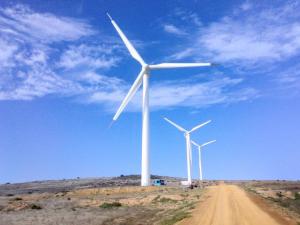Africa’s largest wind farm, with 60 wind turbines, has been officially opened at Jeffreys Bay.
The 138 MW wind power plant, which has been producing electricity since December, is among the projects in the government’s renewable energy programme, through which private companies bid to build renewable energy power stations.
Construction began in December 2012 and all 60 wind turbines had been erected by February. It began feeding electricity into Eskom’s grid in December and was fully commissioned in April.
Globeleq, a private power generation company in Africa has celebrated completion of another of its wind energy projects in Port Elizabeth, the 138MW Jeffreys Bay wind farm located between the towns of Jeffrey’s Bay and Humansdorp in the Eastern Cape.
This follows celebrations in April to mark the start of operations at its two solar facilities, the 50MW De Aar and 50MW Droogfontein installations on the Northern Cape.
All facilities are part of South Africa’s renewable energy programme and are among the very first large scale renewable power plants to be built in the country.
With planned annual production of 460GWh, it is expected Jeffrey’s Bay will avoid production of 420 000 tons of CO2 per year and provide a source of renewable electricity for nearly 100 000 average South African households.
Mikael Karlsson, Globeleq’s CEO said: “The completion of these facilities is the result of a truly global partnership with the South Africa and Eskom and the private sector of developers, investors, lenders, constructors, suppliers and the local community. It demonstrates significant support for independent private power producers in the region and indicates the sustainability of the renewable energy sector.”
South Africa’s renewable energy programme has prioritised job creation and skills development in order to sustain the industry over time.
During the wind farm’s construction, more than 700 people worked on the site, of which 45% were drawn from the local community.
6% of the project’s operational revenues will be reinvested into the local community through socio-economic and enterprise development programmes creating the skills needed to support the growth of the renewable energy industry in South Africa.
The Amadla Omoya Trust will spend 80% of its social development budget on educational projects in low income areas in Port Elizabeth.
Mark Pickering, Managing Director of Globeleq South Africa said: “What an exciting time to be a part of this industry. In such a short period we have built an alternative source of energy which will provide ongoing benefits for the country and the industry alike.”
One of the major issues that negatively impact wind farms is the effect it has on the local wildlife.
Birds and bats are the main casualties of wind farms, as the change in pressure can destroy migration patterns and even collapse the lungs of these animals.
According to Globeleq, the area in which the wind turbines are situated have a very low density of wildlife, based on a number animal studies that were conducted prior to the start of the project.
Globeleq is an experienced developer, owner and operator of independent power projects in the emerging markets, with a specific focus on Africa and the Americas. The company develops economically sustainable businesses that support the continued development of the electric power sector in these regions. Since the company’s launch in 2002, it has participated in nearly 14,000 MWs in 27 countries, investing more than US$1.3 billion of equity across 44 different power projects.
Actis invests exclusively in the emerging markets with a growing portfolio of investments in Asia, Africa and Latin America; it currently has US$6.5 billion funds under management. Actis identifies investment opportunities in three areas: private equity, energy and real estate. Currently, it has energy investments in six countries in Africa, operating under the highest standards of environmental, social and governance standards in the industry and helping the UN define the code for responsible investing.


